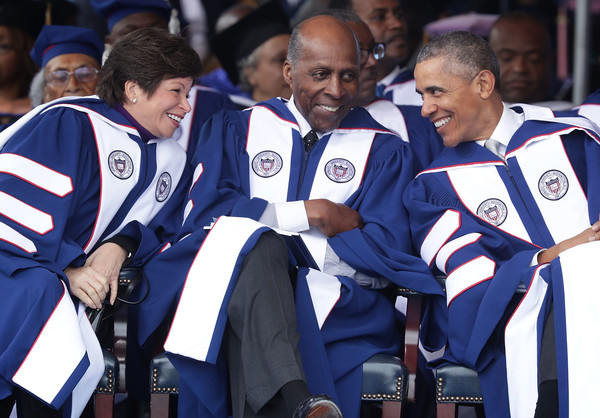Has American evangelicals’ love affair with Dutch Calvinism (in its w-w forms) finally run out of steam?
Remember back to Francis Schaeffer who popularized Kuyperianism for figures like Jerry Falwell (the elder) and Tim LaHaye. In Christian Manifesto (1981), Schaeffer wrote:
The basic problem of the Christians in this country in the last eighty years or so, in regard
to society and in regard to government, is that they have seen things in bits and pieces
instead of totals. They have very gradually become disturbed over permissiveness,
pornography, the public schools, the breakdown of the family, and finally abortion. But
they have not seen this as a totality—each thing being a part, a symptom, of a much
larger problem. They have failed to see that all of this has come about due to a shift in
world view—that is, through a fundamental change in the overall way people think and
view the world and life as a whole. The shift has been away from a world view that was
at least vaguely Christian in people’s memory (even if they were not individually
Christian) toward something completely different—impersonal matter or energy shaped
into its present form by impersonal chance.
W(orld)-(vie)w analysis basically had free reign among evangelicals for the next thirty-five years thanks to its comprehensiveness. Everything became spiritual or religiously meaningful because everything was under the Lordship of Christ. Even if you raised questions about the differences between the spiritual and the temporal, or the ecclesiastical and civil, such “dualism” was in denial of Christ’s sovereignty.
That explains why even Baptist English professors drank Kuyper with gusto:
Within the North American context, Mouw explains, these core points can be boiled down to “an appreciation for the ‘not-one-square-inch’ manifesto regarding the kingship of Jesus, a broad acceptance of the idea of sphere sovereignty, and a commitment to the integration of faith and learning.” Mouw’s examination of these essentials—fleshed out and applied with varying levels of specificity within the thirteen essays which cover topics including public theology, education, and baptism, as well as more esoteric intra-reformed issues—reveal just how great an influence Kuyper has wielded, even among those of us caught unaware. The reading leaves me with awe and gratitude in the recognition that even my own quintessentially Baptist and evangelical educational institution would not be what it is without Kuyper and his fellows. After all, our university catalog promises in its “Statement on Worldview” that students will “receive an education that integrates [a] Christian and biblical worldview,” and the institution increasingly equips, expects, and holds accountable faculty for doing just that—even more noteworthy considering that the memory of a time when “Christian education” was understood there and elsewhere to consist of opening class in prayer has not quite faded into the past.
Even as late as two years ago, Kuyper drew appreciation from the likes of the Muslim-American political theorist, Shadi Hamid, though a non-Christian appropriation of the Dutch statesman would lean toward the pluralism (and the pillarization that went along with it in twentieth-century Dutch society) in Kuyper’s thought:
Christian pluralism sees the city of man as inherently broken and fallen from sin, which, in turn, means that politics must be acknowledged as a site of uncertainty, rather than certainty. The solution, then, wouldn’t be walling off one’s Christianity from the domain of Caesar, but rather applying it in a more self-conscious manner.
That was not how evangelicals read Kuyper. Pluralism went with secular humanism and watch out if you have a diversity of views among Christians about the actual structures of Christ’s Lordship.
But now that many know (what they always knew) about the true nature of Donald Trump and now that the likes of Betsy De Vos and Josh Hawley, Trump supporters of different degrees, have made positive references to Kuyper — now, Trump has finally revealed the problems of Kuyperianism:
we who inherit the legacies of white Christianity are called to acknowledge and seek to repair harm that has been committed on behalf of our traditions. Kuyper’s notion of the lordship of Jesus, articulated in the famous “square inch” quote, has more problems than it being used to baptize a wide range of questionable endeavors or to convey that Christians are the arbiters of the kingdom of God. The very notion of Jesus’ ownership of all things has imperialistic overtones, reflecting Kuyper’s Victorian-era white/European Protestant Christian triumphalism. While Kuyper celebrated cultural “pluriformity,” he maintained that outside of Europe and North America, most cultures had not benefited humanity as a whole. . . .
Even when taken on his own terms, there is much in Kuyper’s legacy to repudiate. And while it would be unfair to label Kuyper a white Christian nationalist, it is easy to see how his ideas could be employed in the service of white Christian nationalism, with its grievance ethos, its “color blindness” as a cover for its racism, its paternalism, its patriarchy, and its “populism” favoring white working-class interests.
What I don’t understand, once again, is why the flip-flops among evangelical scholars — evangelicalism used to be good but now its bad, Kuyper used to inspire but now he’s troubling — don’t raise more questions about the flops. Isn’t it obvious that the change of perception is largely a function of opposition to Donald Trump? If part of the Protestant world showed an attachment to Trump and we are dissecting those Protestants to see what ideas they held so we can purge those notions (and Trump) from our midst, is this really very deep? Isn’t it just another indication of the hold that Trump has on the minds of his biggest foes (and supporters)?
But if not for Trump, evangelicalism and Kuyper would be salvageable, right?










